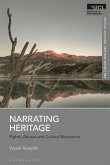The volume provides fresh perspectives on geospatial analysis for cultural heritage and the humanities. By integrating spatial data and analytical techniques, this book offers researchers in the humanities innovative ways to explore and understand human societies, cultures, and interactions with their environments. Moreover, as methods in digital humanities continue to evolve, incorporating geospatial analysis into humanities research enhances data visualization, spatial storytelling, and interdisciplinary collaboration. This book offers a unique collection of case studies from India showcasing the transformative potential of geospatial technology in heritage studies. Each case study highlights innovative ways geospatial analysis has been applied, to understand and preserve India's rich cultural heritage. By presenting real-world examples from different regions and periods across India, this book demonstrates the relevance of geospatial analysis to heritage research. It also inspires future scholars to explore its possibilities within their areas of study. Ultimately, through its collection of case studies, this book contributes to a deeper appreciation and understanding of India's heritage and the role of geospatial technology in its preservation and interpretation. It is a valuable resource for researchers globally working on Indian history, heritage and archaeology.
Bitte wählen Sie Ihr Anliegen aus.
Rechnungen
Retourenschein anfordern
Bestellstatus
Storno








